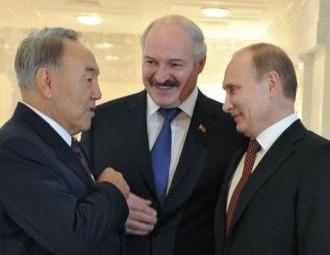Opinion: By joining EEU, Belarus only gains short-term benefits

These benefits are needed to hold the 2015 president campaign and up until 2016. However, Belarus’ long-term dependence on Kremlin will largely increase without any guarantees of integration benefits.
On May 29th, in Astana the presidents of Russia, Belarus and Kazakhstan signed the Eurasian Economic Union (EEU) founding treaty.
The EEU founding treaty, signed by the presidents of Belarus, Kazakhstan and Russia, does not contain new provisions compared with the Customs Union and the Common Economic Space Treaties. The parties have agreed to complete the creation of common markets for electricity, gas, and oil products – the most sensitive commodities for Belarus – only by 2025. As anticipated, the Belarus’ authorities have managed to win some concessions from the Kremlin concerning oil and financial aid, but only short-term and limited.
The bilateral agreement between presidents Lukashenka and Putin regarding oil export duties was signed on May 29th too. According to the agreement, in 2015, the Belarusian budget will gain USD 1.5 billion from export duties on oil products. With this money, President Lukashenka will hold the 2015 presidential campaign in a relatively comfortable environment.
President Lukashenka hopes to get 100% proceeds from oil export duties by 2016. After his visit to Moscow on May 8th, he said, “we’ll come back to this issue in 2016 and within two years we’ll remove these duties and will trade in a civilised way”.
The Kremlin has consciously excluded the Russo-Belarusian Energy Agreement from the trilateral treaty in order to weaken Minsk’s positions. The flexible mechanism for reviewing the oil export duties’ distribution, to which both parties have referred, is not envisaged by any document and allows for liberal interpretations by Moscow. Belarus has attempted to minimise her risks by insisting on signing the annex to the EEU treaty, which would include the Energy Agreement. Yet Russia has not supported this Belarusian initiative.
Minsk and Moscow also agreed about a constant volume of oil supply to Belarusian refineries up until 2025, which previously had often been the subject of controversy and pressure from the Kremlin. In 2015, 23 million tons of oil will be shipped to Belarus, and in the following years, this volume will be increased to 24 million tonnes. However, the Russian government is pondering about a ‘grand tax maneuver’, which implies at as of 2016, Russia might gradually reduce export duties on oil and increase tax on mineral extraction. As a result, Belarus’ revenues from oil refining could reduce considerably.
The Belarusian government also awaits a USD 1 billion bridge loan to be allocated by Russia’s VTB-Bank, which should arrive “in 10-14 days” in order to ensure the national currency’s stability in anticipation of the USD 2 billion interstate loan.
Currently Belarus receives sufficient support from the Kremlin to maintain Lukashenka’s socio-economic model until the end of the election campaign in 2015. However, in the long-term, the Kremlin reserves levers of pressure on the Belarusian authorities.
Originally published on Solidarity with Belarus Information Office
-
03.01
-
07.10
-
22.09
-
17.08
-
12.08
-
30.09








































